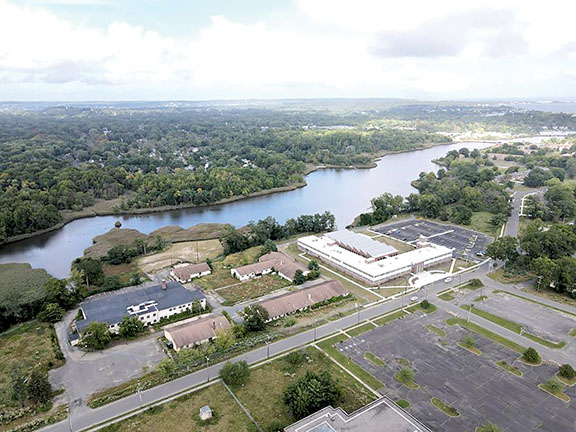
By Laura D.C. Kolnoski
OCEANPORT – Two months ago, New Jersey City University officials were contemplating vacating the school’s year-old campus on Fort Monmouth following revelations of a financial crisis at the Jersey City-based institution. Last week’s announcement of a new round of cost-cutting measures are bolstering hope the school will remain open on the redeveloping former U.S. Army base.
The elimination of three senior management positions – chief operating officer, chief strategy officer and vice president for enrollment management – is expected to save NJCU at least $750,000 per year. Concurrently, the school’s six executive divisions have been reduced to four: academic affairs, advancement, finance and administration, and student affairs and enrollment management.
“This significant reorganization is part of NJCU’s rightsizing efforts… following significant concessions between university management and its faculty union designed to reduce costs,” officials said in a press release.
The latest round of cuts is in addition to NJCU instituting $10 million in “cost containment strategies… that have sharply reduced its budget deficit with a goal of reaching budget neutrality by June 2023,” the press release continued. The public university’s management-level workforce has been reduced over 30 percent since the pandemic, and leadership has worked with the faculty unions “to ensure these burdens are shared equally… while maintaining services and the student experience.”
Whether that experience will include the Oceanport campus remains to be seen. When NJCU’s multimillion deficit was announced in June, layoffs followed, including for Michael Edmondson, Ph.D., dean of the Fort Monmouth campus. Since then, there have been pay cuts, employee furloughs, budget reductions and organizational consolidation. Tuition and fees were raised and vacant positions eliminated.
Discrepancies over NJCU’s financial figures prompted Gov. Phil Murphy to call for a formal investigation into school’s finances by the state comptroller in August. Murphy cited figures purportedly showing the school went from an approximate $108 million surplus in 2014 to an approximate $67.4 million deficit with $156 million in debt. The university’s external financial advisory firm called those figures inaccurate. At the time, state Sen. Vin Gopal (D-11), chair- man of the Senate’s Education Committee, called for a different university to take over the Oceanport campus.
In the interim, NJCU requested accelerated allotments of its state appropriations and asked the New Jersey State Legislature’s Joint Budget Oversight Committee for at least $35 million in capital expense funding from the American Rescue Plan. Officials also applied for a $15 million Higher Education Infrastructure Trust grant. The school has identified at least $25.93 million in “critical infrastructure needs.” Emailed questions and a voicemail left with the New Jersey Department of Higher Education to learn the status of the investigation and funding requests went unanswered by press time. Ira Thor, NJCU spokesperson and senior director of university communications and media relations, said last week the school did not have updates or timelines on those matters.
Enrollment at the Oceanport campus is currently 195, down from 306 last year, while overall enrollment at the 92-year-old university at the start of the fall semester was down over 250 students. Officials attributed some of the decline to the pandemic, while news of uncertainty in Oceanport was cited as a cause of lower enrollment there. Another contributing factor cited by the board was “aggressive expansion of NJCU’s real estate footprint,” including leasing Fort Monmouth’s Squier Hall.
Sources indicated that while a decision on the school’s future on the fort is still being evaluated, stakeholders are “very optimistic the school will continue its Oceanport operations.”
The 1930s-era Squier Hall underwent extensive renovations to transform into a state-of-the-art modern university. Highlights include high-tech, immersive facilities for those studying advanced homeland security, and NJCU’s award-winning nursing program, named an Apple Distinguished School for 2022-’25 for its iNurse Initiative and “innovation, leadership, and educational excellence.”
NJCU offers 50 undergraduate, 30 graduate, and three doctoral programs at its main Jersey City campus, it’s School of Business in the Jersey City Financial District, and the Fort Monmouth location.
“I could not be more grateful to our administrative team, namely acting President Jason Kroll, who has led NJCU admirably through this challenging period, but also our entire community of faculty, staff, students and alumni for their support,” said NJCU Board of Trustees chair Joseph Scott.
With the elimination of the three executive positions, CFO Aaron Aska will retire effective Dec. 2, Benjamin Rohdin will no longer serve in the interim role of vice president for enrollment management, and Jason Kroll will no longer be chief strategy officer, but will continue in his role as acting president.
Opened in 1929 as the New Jersey State Normal School, the institution was renamed New Jersey State Teachers College in 1935, and Jersey City State College in 1958. It became NJCU in 1998.
The article originally appeared in the November 24 – 30, 2022 print edition of The Two River Times.














